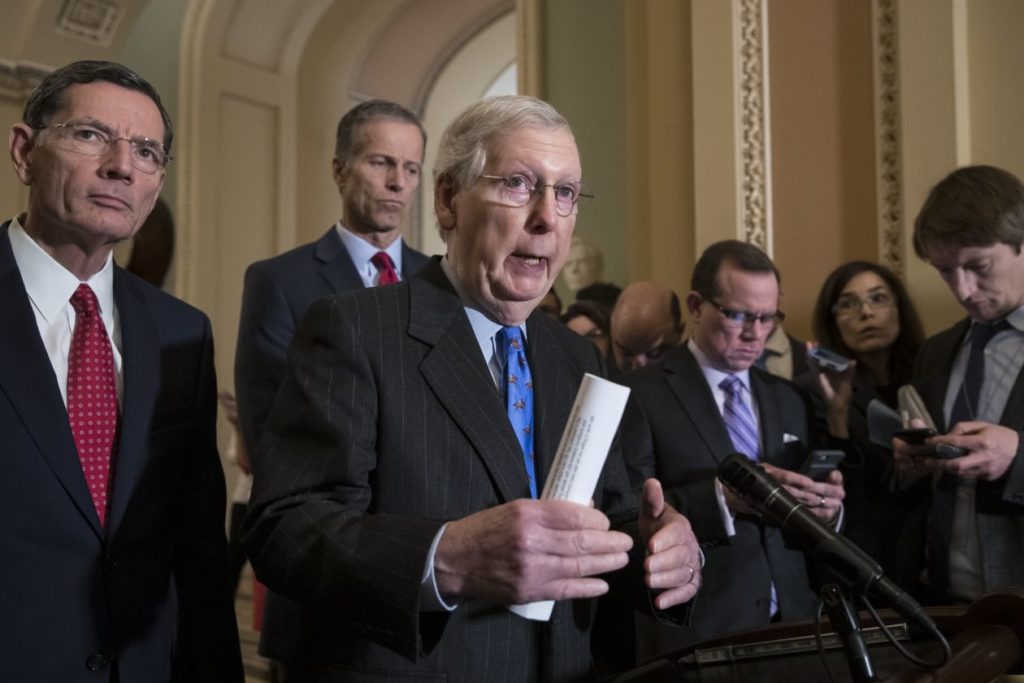Senate Passes Landmark Criminal-Justice Overhaul Bill In Bipartisan Vote (#GotBitcoin?)

The Senate on Tuesday passed a landmark bill that would change sentencing guidelines for federal prisoners—and would allow early release for potentially tens of thousands of inmates who were convicted of nonviolent crimes. Senate Passes Landmark Criminal-Justice Overhaul Bill in Bipartisan Vote
First Step Act could allow early release for tens of thousands of federal inmates.
The bill was overwhelmingly approved in an 87-12 vote. Sen. Lindsey Graham (R., S.C.) was absent. The legislation now heads to the House, where it also has bipartisan support. Speaker Paul Ryan (R., Wis.) has promised to take it up before the session of Congress ends.
Known as the First Step Act, the bill would be the most far-reaching overhaul of the federal criminal justice system in decades. It would shorten some mandatory minimum sentences and give judges more discretion in determining penalties, among other provisions.
President Trump said Tuesday night that he looked forward to signing the bill.
“Congratulations to the Senate on the bi-partisan passing of a historic Criminal Justice Reform Bill,” Mr. Trump wrote on Twitter. “This will keep our communities safer, and provide hope and a second chance, to those who earn it.”
The bill divided the Republican caucus, leading to tension between lawmakers. At a closed-door lunch on Tuesday, Sen. Mike Lee of Utah defended the bill and pressed Sens. Tom Cotton of Arkansas and John Kennedy of Louisiana about proposed amendments to the bill, according to a person in the room. Voices became elevated, to the point where Republican aides said they heard yelling from the other side of the door.
Senate Majority Leader Mitch McConnell (R., Ky.) described the discussion as “spirited.”
The House will consider the bill this week. A version of the bill passed the House earlier this year, so it is expected to be approved.
“He’s got a pen ready to sign this bill,” Sen. Chuck Grassley (R., Iowa), the Judiciary Committee chairman, said of the president. Mr. Trump’s endorsement of the bill last month brought several Republican senators worried about being criticized for being weak on crime on board.
The bill calls for evaluating all federal inmates to find convicts who have a low risk of recidivism and didn’t commit violent crimes—and then helping them through programs like counseling and job training. For every 30 days spent in a program, an inmate can earn 10 days of prerelease custody, for up to a year of release early to a halfway house or program outside of prison.
“The overwhelming majority of prisoners eventually get out,” Mr. Lee said in an interview. “What we want is to make society safer by reducing the likelihood they will reoffend once they get out.”
Inmates who participate in education programs have 43% lower odds of returning to prison than those who don’t, according to a 2013 study by Rand Corp., a nonprofit research organization. Employment after release was also 13% higher among prisoners who participated in either academic or vocational education programs than those who didn’t.
The bill applies only to the federal prison system, which has about 180,785 inmates and makes up a small percentage of the U.S. jail and prison population. But for future defendants in federal courtrooms and present convicts in federal prisons, it could spell less prison time—and sooner release.
Opponents of the bill introduced amendments that were ultimately unsuccessful. Mr. Cotton advocated for more specific language in the bill on what violent crimes were ineligible for early release. Proponents argued that this was redundant.
Mr. Kennedy called the bill “paint on rotten wood” and said he couldn’t give more “discretion to the Bureau of Prisons to decide who gets to stay in prison and who gets to stay free.”
Last-minute changes were amended to exclude additional categories of violent felons for early release, including carjackers who intended to cause serious bodily injury. A different amendment allowed faith-based groups to receive public funding for recidivism programs.
The bill also would reduce, retroactively, some penalties affected by the disparity in crack-cocaine sentencing and powder-cocaine sentencing, which was narrowed in a 2010 law. Most people serving time for crack in 2010 were black, while those serving time for powder-cocaine charges tended to be white or Hispanic.
“There are people sitting in jail right now for selling an amount of drugs the size of a candy bar who have watched people come in and leave for selling enough drugs to fill a suitcase,” said Sen. Cory Booker (D., N.J.) on the Senate floor of the disparity.
Related Article:
Have You Broken A Federal Criminal Law Lately? Who Knows? No One Has Been Able To Count Them All!!!
Go back
Leave a Reply
You must be logged in to post a comment.